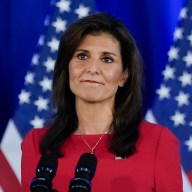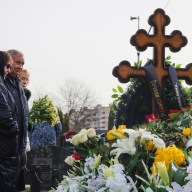KANDAHAR, Afghanistan – After the last election held in Afghanistan, in 2005, a group of independent observers recommended that, in future, polling stations should not be located in candidates’ homes.
The recommendation from the Free and Fair Elections Foundation of Afghanistan might prompt a chuckle, but it also serves as a reminder of just where this warring nation’s fledgling democracy is at.
On Thursday, Afghans will go to the polls for the third time since the Taliban was toppled from power in 2001, the second time to cast ballots for their president, and the first time in a vote led by Afghans themselves.
“Inshallah,” says Muhammad Nadir. God willing.
Nadir, 46, says he will vote and it won’t be for President Hamid Karzai.
“There are no jobs and no security,” says Nadir, a money exchanger in Kandahar city.
Muhammad Khalid , 31, says he will cast his ballot for Karzai because it’s his right, but he may have to muster his courage to do so.
The vote will take place in the worst security situation the country has seen since the Taliban was ousted. The Interior Ministry recently acknowledged that 10 of the country’s 360 districts are not under government control, and a third of the 360 districts are considered high-risk areas.
Taliban have threatened death or dismemberment to anyone who heads to the polls.
In leaflets pinned on mosque walls in Kandahar city late Saturday, the militants warned they will use “new tactics” as they try to undermine the vote.
“You should not participate in the elections and should not go to the polling centres because officials might be there and there might be attacks against them,” said the letter signed by Ghulam Haidar, the Taliban’s operational Kandahar commander.
Earlier in the day, a suicide bomber struck outside NATO headquarters in Kabul, killing seven people and wounding 91, including a Canadian living in Afghanistan and an Afghan employee of the Canadian embassy. The Taliban claimed responsibility for the attack.
“Yes, Taliban will try to stop the election and I will be afraid,” says one woman, a Kandahar school teacher who does not want her name published.
“But I will vote because I am a school teacher and if I will not vote, how can an illiterate woman go vote?”
Another woman, a housewife with five children, says that if it seems safe, she will cast a ballot.
“The Taliban will try to stop the election. I am afraid,” she says. But “my husband told me to vote; it is our right to vote.”
Whether that right is a reality next Thursday remains to be seen. The stakes are high for all involved.
President Hamid Karzai predicted his own victory a few days ago but despite his confidence, Karzai’s leadership and his corrupt government have been a disappointment to many Afghans, who have seen little improvement in their lives since he was appointed president in 2001, and then elected in 2004.
For the international coalition, including Canada, a major disruption at the polls eight years after the Taliban was toppled would be a blow.
But if all goes well, Afghans will not see any Canadian or other coalition soldiers on election day. The international troops have taken great pains to distance themselves from the vote and any appearance of influence.
They will, however, be ready to respond to any serious attack should the Taliban carry out their many threats.
The challenges for Thursday’s vote are not limited to insurgent threats.
A nationwide election in Afghanistan poses immense logistical challenges. More than 3,000 donkeys were put into service to distribute election materials across this vast and rugged country, and the vote count is expected to take weeks.
The ballots being distributed to about 7,000 polling centres will include photos of the candidates, because the vast majority of Afghans cannot read.
The Electoral Complaints Commission has disqualified 57 candidates – 56 of them for being members of illegal armed groups and one for having a criminal record. Last week, the commission fined Karzai’s vice-presidential running mate, and current second vice-president, for misuse of government resources in the campaign.
Irregularities in voter registration were reported in several parts of the country by national and international organizations, and critics say there could be millions of fraudulent voter registration cards out there among the 17 million eligible Afghan voters.
The Independent Election Commission has said that up to 500 polling centres may not be able to open due to the security situation, many of them in the southern region of the country. Kandahar province is supposed to have 228 polling centres but nobody will try to predict how many will be open on Aug. 20.
Yet, Grant Kippen, the Canadian chairman of the Electoral Complaint Commission, says overall the campaign has gone well in this struggling country.
“I’m optimistic,” says Kippen, who says the Afghans are doing a good job despite the challenges they’re facing.
There will be independent observers and candidate scrutineers at the polling centres, he says.
“There’s a lot of work being done right now to make sure it’s one person, one vote. Just because somebody holds several registration cards, doesn’t mean they will get to use them.”
But Thomas H. Johnson, a research professor in the Program for Culture and Conflict Studies at the Naval Postgraduate School in Monterey, Calif., said the probability of a “free and fair” election as defined by western standards is “almost nil.”
Johnson said he recently visited Kandahar city, where he was told that more than 200,000 female voter registration cards had been bought for $1 each. And he’s been told that industrial-sized barrels of ink remover – to remove the indelible ink used to mark voters’ fingers – have been purchased from Iran.
“These facts suggest to me that mechanisms are already in place that will help to significantly corrupt the elections,” Johnson said in an email interview.
But if the threat of voter fraud is high, the threat from insurgents may not be, he said.
There appears to be a high level of voter apathy in southern Afghanistan, he said, and the Taliban may not feel any need to target the election.
“I actually found it very difficult to find a Kandahari who would admit that they had participated in past elections. I believe these elections mean much more to us than they do for the Afghans,” he wrote.
But there could be violent fallout if there is widespread voter fraud and losing candidates prompt the public to violence, he said.
Despite the many complaints about his leadership, or lack of it, Karzai remains the frontrunner. His most credible challengers are his former foreign minister Abdullah Abdullah and former finance minister Ashraf Ghani.
If none of the presidential candidates garners 50 per cent of the vote plus one in the first round, there will be a run-off vote in late September, at the earliest.
-With files from A.R. Khan in Kandahar city
















